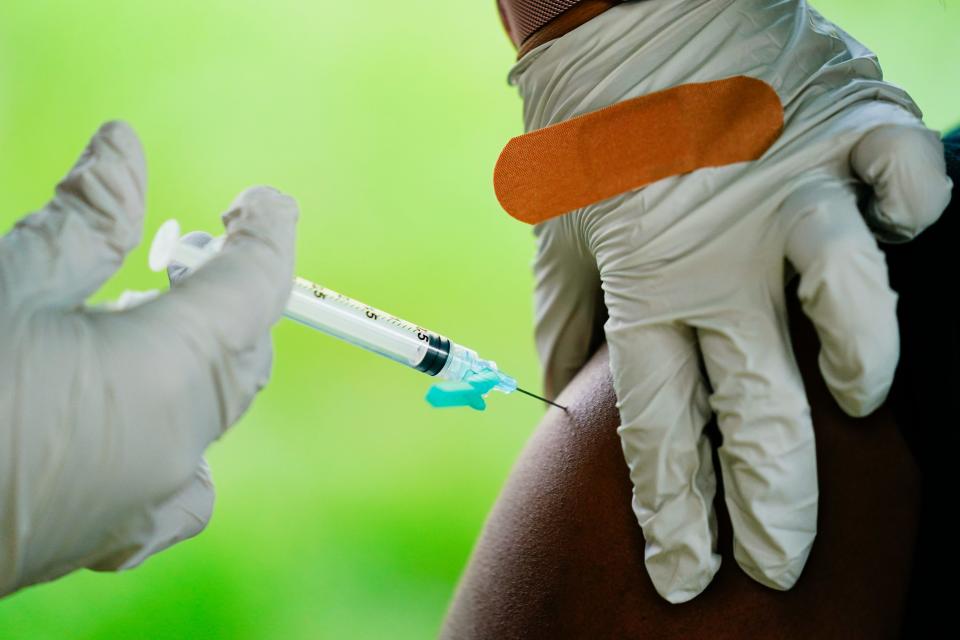Fact check: ICD-10 medical codes are used to track trends, not individuals
The claim: Post implies the government is tracking unvaccinated individuals
A Feb. 16 Instagram post (direct link, archived link) makes a claim about the federal government's surveillance efforts.
"The federal government is tracking the unvaccinated," reads the text featured in the post.
"Under this program, doctors at clinics and hospitals have been instructed to ask patients about their vaccination status, which is then added to their electronic medical records as a diagnostic code, known as ICD-10 code, so that they can be tracked inside and outside of the medical system," reads part of the post's caption.
Some commenters expressed concern that this meant the government was tracking their movements.
"Careful… my tracking is good out to about 500 yards!!! Leave me alone," reads one such comment.
The post generated nearly 200 likes in less than a month.
Follow us on Facebook! Like our page to get updates throughout the day on our latest debunks
Our rating: Missing context
The implied claim here is wrong. Medical experts said federal laws protect a patient’s medical information from being disclosed. The codes attached to a certain patient are used to track general trends or other medical purposes, according to experts, not for tracking specific individuals.
Post misleads on medical codes
Medical experts told USA TODAY the post exaggerates the use of ICD-10 medical codes by health care professionals and other entities.
ICD-10 stands for the tenth revision to the International Classification of Diseases, a manual of codes used by health care professionals to classify diseases and mortality statistics, according to the World Health Organization and the Centers for Disease Control and Prevention.
Since 2015, the Department of Health and Human Services has mandated that all entities covered by the Health Insurance Portability and Accountability Act (HIPAA) – which includes health care providers, health care clearinghouses and health plans – use ICD-10 codes for electronic healthcare transactions, according to the CDC.
In April 2022, the ICD-10 manual was updated to include three codes tied to COVID-19:
"Unvaccinated for Covid-19" (Z28.310)
"Partially vaccinated for Covid-19" (Z28.311)
"Other underimmunization status" (Z28.39)

These codes allow medical professionals to collect data on vaccine efficacy, like how many unvaccinated and vaccinated patients are sick or dying in the hospital or intensive care unit with COVID-19, Dr. Eric Burnett, an internal medicine expert at Columbia University, told USA TODAY in an email.
The claim asserts the codes are used to track people "inside and outside of the medical system," but that's not how the system works, experts say. Burnett said it would "most certainly be" a HIPAA violation, for example, for health care professionals to share patient info with non-HIPAA entities like the FBI for tracking purposes.
Fact check: False claim that Hunter Biden paid Joe Biden $50,000 in rent for Delaware home
There are parts of HIPAA that allow public health authorities like the CDC and the Food and Drug Administration to have access to the codes, according to Burnett, but this information typically excludes patient identifiers like names.
“They cannot just ask for the information because they feel like tracking certain individuals," Burnett said. "They need a specific reason for doing so."
Even if these entities had a specific reason, the information sent to them would need to comply with HIPPA regulations.
"If they do need specific patient information – for example, if a person came in contact with HIV – they can get it from a HIPAA-protected entity, but only the minimum amount of information needed to achieve their goal," Burnett said.
Bert Kelly, a CDC spokesperson, also told USA TODAY in an email that the CDC "does not have any (patient-specific) data on the codes and does not track this information."
The codes are also present on bills submitted to an insurer to address why the patient made a hospital visit, according to Karen Joynt Maddox, co-director of the Center for Health Economics and Policy at Washington University in St Louis.
"These codes are only on bills, so they aren’t public," Maddox said. "If I go to my doctor and they put a code in a bill that indicates I have diabetes, that information doesn’t go to my employer or to my neighbor or to my senator. There are laws that protect personal medical information."
USA TODAY reached out to the social media users who shared the claim for comment.
Reuters and AFP also debunked the claim.
Our fact-check sources:
Bert Kelly, Feb. 27, Email exchange with USA TODAY
Kyle Enfield, Feb. 24, Email exchange with USA TODAY
Karen Joynt Maddox, Feb. 24, Email exchange with USA TODAY
Eric Burnett, March 3, Email exchange with USA TODAY
World Health Organization, accessed March 2, International Statistical Classification of Diseases and Related Health Problems (ICD)
CDC, Dec. 29, 2021, International Classification of Diseases, Tenth Revision (ICD-10)
CDC, Sept. 14, 2021, ICD-10 Coordination and Maintenance Committee Meeting
Centers for Disease Control and CDC Fact Check, Feb. 23, Claims about US medical codes for unvaccinated are misleading
Reuters, Feb. 21, Fact Check-Claims of ICD-10 codes used to track unvaccinated individuals missing context
Thank you for supporting our journalism. You can subscribe to our print edition, ad-free app or electronic newspaper replica here.
Our fact-check work is supported in part by a grant from Facebook.
This article originally appeared on USA TODAY: Fact check: ICD-10 medical codes track trends, not individuals

